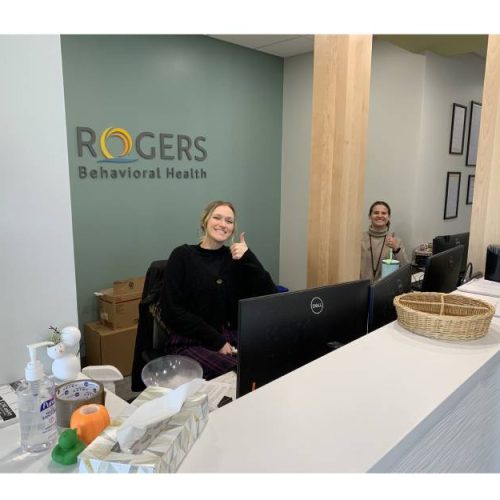Posted on 01/26/24 09:14:am
Rogers expands scope of services in new West Allis clinic
TMS, In-person Outpatient Psychiatric Services to be offered
WEST ALLIS, Wis. – From in-person psychiatric outpatient care to transcranial magnetic stimulation (TMS), Rogers Behavioral Health is expanding its offerings in West Allis in a new clinic location.
Recently open to patients, the clinic offers treatment for OCD and Anxiety, Depression Recovery, Trauma Recovery, and Mental Health and Addiction Recovery through intensive outpatient and partial hospitalization programs (IOP and PHP). Intensive outpatient programs typically meet three hours a day, five days a week, for four to eight weeks, while partial hospitalization programs usually meet six hours a day, five days a week, for four to eight weeks.
Previously, Rogers leased two buildings in West Allis, one for adults and another for children and adolescents. Located between the former clinics, Rogers purchased a new building at 2424 S. 102nd Street to provide treatment for all age groups.
“Our investment in a new building is one way Rogers is demonstrating our commitment to serving West Allis and surrounding communities,” says Brian Kay, chief strategy officer. “The new space is beautiful. It’s a place people can receive high-quality treatment in a non-stigmatizing way.”
In-person Outpatient Psychiatric Services open to community, tackles shortage
Also new starting January 29, the West Allis location will offer in-person Outpatient Psychiatric Services, allowing community members to receive psychiatric evaluations and ongoing medication management.
Amid a national shortage of psychiatry services nationwide, the new program addresses long waiting lists for outpatient providers who can offer patients medication management after discharge.
“It can be challenging for primary care providers to have deep expertise in prescribing psychiatric medication, especially for patients with complex conditions, so we at Rogers answered the call,” says Signa Meyers, vice president of strategic initiatives. “There’s no shortage of patients who need psychiatric care, and we are going to make our communities better by getting these patients off waitlists and into the care they need.”
The Outpatient Psychiatric Services program began virtually in October to both prospective and current Rogers patients.
Daniel McCool, nurse practitioner at Rogers’ West Allis clinic, says he’s seen how the program is making a difference, already allowing him to see patients within days of their initial contact with Rogers. In one case, he says he was able to intervene early enough to prevent what could have been a crisis.
“Prior to starting this service at Rogers, patients from inpatient, residential, IOP and PHP care would be scheduled three to six months after discharge for psychiatric treatment in the community at a time when they were most vulnerable,” McCool says. “It’s been encouraging to see patients have more rapid access to psychiatric providers and the ease of access internally to other levels of care within the Rogers system. I’ve already personally witnessed the value of this program through prevention of unnecessary admissions, and potentially life-saving early intervention.”
TMS services starting in West Allis
Rogers will soon begin scheduling appointments at the new West Allis clinic for TMS, or transcranial magnetic stimulation.
TMS uses a specialized electromagnetic coil to produce targeted magnetic pulses that stimulate a portion of the brain underactive in patients suffering from depression. It has been shown to reduce depressive symptoms, with about 50% of patients seeing a significant decrease in symptoms.
The treatment requires short daily sessions over several weeks. Meyers says for those with major depressive disorder that hasn’t improved with more traditional treatments, TMS is a great option, with evidence to show it works on treatment-resistant patients. Some insurance plans also cover TMS for OCD.
“When it comes to mental health and substance abuse care, if we can offer just one more line of hope, it’s everything,” Meyers said. “It can mean better families, better communities, and it can change lives. Hope is really everything, and TMS can provide that.”
Beyond the West Allis clinic, Rogers is committed to innovative solutions and evidence-based treatment in all areas it serves.
“We’re listening to our communities and responding to their needs,” says Dr. Rae Anne Ho Fung, executive director of clinical integration. “Our expanded services in West Allis are a part of that, and Rogers has exciting new programs still to come.”
About Rogers Behavioral Health
Rogers Behavioral Health is a nationally recognized, not-for-profit provider of mental health and addiction services. Based in Wisconsin since 1907 with locations in 10 states, Rogers is one of the largest behavioral healthcare providers in the United States. Rogers offers evidence-based treatment for adults, children, and adolescents with depression and other mood disorders, eating disorders, addiction, OCD and anxiety disorders, trauma, and PTSD. In addition to a growing network of locations in California, Colorado, Florida, Georgia, Illinois, Minnesota, Pennsylvania, Tennessee and Washington, Rogers operates three inpatient behavioral health hospitals, 17 residential programs and seven outpatient centers in Wisconsin. The System also includes Ladish Co. Foundation Center, home to Rogers Research Center, the Rogers Foundation, and the Ronald McDonald Family Room®. In addition, Rogers leads the nationwide WISE coalition with the goal of eliminating stigma related to mental health and substance use disorders. Learn more at rogersbh.org.
Contact:
Maddy O’Neill
Cell: 262-599-4542
Email: madalyn.oneill@rogersbh.org


